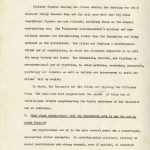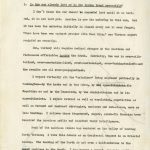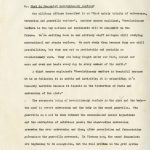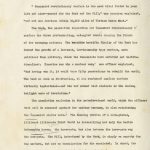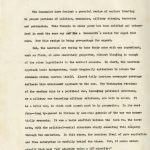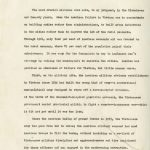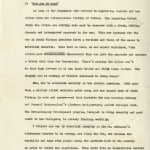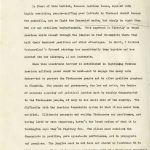1967, October 27, “In Vietnam for the Past 5 Years”
Beverly Ann Deepe
38 Vo Tanh
Saigon, Vietnam
October 27, 1967
reflections–page 1
SAIGON, SOUTH VIETNAM
The editors of Parade requested me–a correspondent in Vietnam for the past five years–to write an article expressing my personal impressions on the war in this crisis-land. I was to pose the ten most significant questions I could think of and then provide the answers. I objected. The number ten is distinctly unlucky in Vietnam. Often, I hear Vietnamese street urchins hurl the worst of insults at American officials–“You No. 10”–when no coins are dropped into their begging tins. Even the Vietnamese Army bowed to this cultural amenity by changing the numerical designation of its 10th Infantry Division to Number 18.
But, why not nine questions oand answers? Nine is a very lucky number in Vietnam, based on some intricate, but common form of gambling. I noted the new Vietnamese Constitution was deliberatey deliberately drafted with nine chapters. The membership of the elected drafting assembly was 117 (the digits totalling nine), which has lead one Vietnamese p newspaper to label it “the village of the nine stupidities.”
(More)
Deepe
Reflections–page 2
The two successful Vietnamese generals who ran for and won the Presidiential election successfuly maneuvered so they could acquire the favorable ticket no. 9. Avist A Vietnamese car license plate, in which the digits total nine, is espicially prized and costs and additional 5,000 piastres 4( 50)($50) as an under-the counter bribe to the issuing authorities.
Thus, feeling more inclined to observe than to ignore this Vietnamese good-luck omen, I submit the following nine Deepe reflections on Vietnam without the common masquerade of Journalistic objectivity.
1. Are the Allies winning or losing the war?
Losing. America is in the midst of losing her first major war in history. She is losing more efficiently now than at any time since American ground troops were committed here in early 1965. The tide has not turned–but at least there is now a tide to turn, unlike the perilous near-defeat in 1964. The Americans are presently heading not for stalemate for but for a dead end. There is currently no light at the end of the tunnel; one is not even assured there’ s a hole at the end of the tunnel. The weight of the U.S. position currently is “Don’ t rock the boat,” yet the boat is not only rocking–it is sinking.
(More)
Deepe
Reflections–page 3
Military figures showing the Allies winning the shooting war are r released simply because the are the only ones that show it; other significant figures are not released, including those on the crucial non-shooting war. The Vietnamese anti-Communists’s military and non-military sectors are deteriorating faster than the Communists are being weakened on the battlefield. The Allies are fighting a conventional-styled war of annhiliation , in which the classical objective is to kill the enemy destroy his bases. The Communists, however, are fighting an un-conventional war of attrition, in which politics, economics, propaganda, psychology and [wephobiaweapons?] as well as bullets are inter-woven to erode the allies’ will to resist.
In short, the Communists and the Allies are fighting two different wars. The Americans have computerized the minute of their war of annhiliation without comprehending the deadly substance of the Communist war of attrition.
2. What about negotiations with the Communistss side to end the war with South Vietnam?
Any negotiations now or in the next several years are a camouflaged, slow-motion Allied surrender. No anti-Communist political, military or social institutions are strong enought, even if unified, to withstand the organizational and ideological momentum of the Communists if they allowed into a coalition government. Negotiations are not so much a means to end shooting war they are to shift the vehicule of warfare almost [?]
Deepe
Reflections–page 4
3. Is the war already lost or is the losing trend reversible?
I don’t think the war should be conceded lost until it is lost. And, it is not lost yet. America is not the underdog in this war, but it has been the underdog initially in almost every war it ever fought. “Wars have been won against greater oldds than this,” one Vietnam expert reminded me recently.
But, victory will require radical changes by the American and Vietnamese officialdom inside the South. Currently, the war is over-militarized, over-conventionalized, over-Americanized, over-Washingtonized–and the results are all over-propagandized.
I reject virtually all the “solutions” being espoused publically in Washington–by the hawks and by the doves, by its oppositionists.the Republica ns and by the Democrats, by the Administration and by its oppositionists. I reject retreat as well as escalation, negotiation as well as forward and backward strategies, enclaves and cut-claves, more or less bombing. I believe these fragmented, sugary, quick-fix theories have deceived the American public and insulted their intelligence.
Much of the American debate has contered on the policy of bombing North Vietnam; I view this debate as an Occidental tempest in an Oriental teacup. The bombing of the North is not even a half-solution to the peopl problems in the South. I has become a second, separate problem, orbitting as a satellite to confuse the Vietnam war without touching the down-earth realities in the South.
Deepe
Reflections–page 4 5
The American air-advocates have miscalculated the effectiveness of airpower in ending the war; the American political leadership has swallowed its own propaganda in believingt the problems of the South spring predominantly and exclusively from North Vietnamese aggression. One must remember that South Vietnam is the battleground where the war will be won or lost; the homegrown problems of the South–shooting and non-shooting–are the ones that must be solved. These solutions can not be found without American military power in the South, yet, paradoxically, military power alone can not sove solve them. The war in the South is neither confusing nor inscrutable. But it is inordinately complex.
4. What are the consequences of an American defeat in Vietnam?
Once Vietnam is lost, Communism is half-way to India and once India is lost, America is a second-rate power.
The battle of Vietnam involves more than Vietnam; it is the test of American in 1967 through the 1970’s. Vietnam is the visible symbolic contest between the western way of life and Communism. Vietnam did not create the bitter confrontation between America and the Communist world; Vietnam is simply the flashpoint of that continuous cold-war confrontation. If America loses in Vietnam, it will lose millions and millions of minds all over the world. The battle for India and South America n will be lost before it is ever started. The Mao-ist version of Communism will have successfully negated or neutralized the power of the most powerful nation in history
(More)
Deepe
Reflections–page 6
An American defeat in Vietnam before China has developed her nuclear umbrella would tend to catapult Asia into the Communist orbit. The civil upheaval within China has not impeded her ability to build a sophisticated nuclear delivery system. By the mid-19670’s, China will probably have developed the nuclear-equipped ICBM‘s capable iof obliterating New York and Washington. While China may not decide to atomize America, what about Singapore, Hong Kong, Seoul and the Indian sub-continent? This question, now a sub-current within the Vietnam problem, is already being asked by Asians–yet the non-Communist power in Asia can not provide the answer.
5. Why is America fighting in Vietnam in the first place?
I view most of the official explanation as so fragmented and inarticulate as to be unsatisfactory; none of these have captured this momentous pivot point in history. So, through the years I have asked this same question–of Americans, Asians, Europeans, Vietnamese in and out of the government. Only one person I interviewed foresaw the immense global and historical importance of this war. The answer of this Western diplomat was so filled with eloquence and perspective, I’ll take the liberty of quoting him at length.
(More)
Reflections–page 7
“The world is posed with new problems–the problem of the emerging nations. Three decades ago, there were only six nations in the world worth worrying about; the embassies of the world could be counted on two hands. Until 1940, no one worried about the United States–it was a brash revolting ex-colony on the other side of the Atlantic. Then, all too suddenly, in 1945, the world blossomed into scores of new nations, each fumbling like a new baby bereft of its nanny. They should have stayed in the nursery longer. But, the departure of the colonial powers have created a vacuum.
“Which way will they follow–the west or Communism?”
“These new nations are rife with the ideas or Communism. They are poor essentially|poor–and by themselves have no means or hope of ever reaching any significant standard of living. It’s plain they’re wide open to the Communist doctrine–cloadl cloaked in xenophobia, taking from the haves and giving to the have-nots. They can’t be a capitalist nations because they have no capital. Thus, this post-war world is a battle and the emerging nations the battleground.
“The United States has a blend of self-interest and altruistic motives in defending Vietnam. America really believes Communism deprives the weaker nations, is oppressive and brings misemisery. Communism is the modern tyrant of Genghis Kah Khanh and Hitler and America has always been against the tyrant. It doesn’t take the political genius of a Churchill to [?]
Deepe
Reflections–page 8
s “So, America must fight it out and she will receive little in return in the short range. As one bitter American here reminded me recently ‘Never have so many|done so much for so little thanks.’
“But, one must remember, on the broad canvas of history, there are repositories of wealth and knowledge which one nation gives to the whole world. The Greeks had it, the Chinese, the Romans, the British and now the Americans. These repositories are not simply gold in Fort Knox, but the enormous human wealth in the shape of genuis , ingenuity and production; they are the will to work and the will to produce.
“Every great power has had its own special genuis , but it had to out-going. A nation that lookede only inward stagnated and died. Rome‘s special gift to the world made Britain a better place to live in 400 B. C. than in the Victoria era. Now, if America chooses to defend only her own shores and hide behind her nuclear cobwebs, Communism will sweep onward. The world will be|returned to the Dark Ages.
“The Communists have developed a new tecchnique to seize power called revolutionary warfare or “wars of liberation;” the United States is only nation with the power to stop them. Vietnam is as good a palce placex as any to stop them and the 1960’s as good a time. So, American must give and fight or stagnate and idie.”
(More)
Deepe
Reflections–page 9
6.. What is Communist revolutionary warfare?
One military officer described it as “that unholy trinity of subversion, terrorism and guerrilla warfare”. Another source explained, “Revolutionary warefare is the way nations and continents will be conquiered in the future. We’re settling down in our military staff colleges still studying conventional and atomic warfare. We must study them because they are still possibilities, but they are not as predictable and probable as revolutionary wars. They are being fought under our feet, around our ears and over our heads every day in every corner of the world.”
A third source explained: “Revolutionary warfare is beautiful because it is so delicate; it is subtle and invisible; it is scientific; it’s damnably horrible because it depends on the distortion of facts and subversion of the mind.”
“The corporate being of revolutionary warfare is the mined and the body–the mind is covert subversion and the body is the armed guerrilla. The guerrilla ca n not be born without the economic-and social injustices and the corruption of political power; the clandestine subversion precedes the overt subversion and then, after percolation and fermantation galvanizes the guerrilla movement. In Vietnam now, the armed Communists are beginning to be manageable, but the real probelem is the grid system in which they move.”
(More)
Deepe
Reflections–page 10
” Communist revolutionary warfare is the most vital factor in your life and mine–except for the Bomb and the Pill,” one American explained. “And not one American within 10,000 miles of Vietnam knows that.”
The Bomb, the population explostion and Communist revolutionary w warfare are the three predominating, entangled treunds shaping the future of the emerging nations. The horrible horrific finality of the Bomb has forced the growth of a low-cost, low-intensity type of warfare, more political than military, which the Communists have codified and institutionalized. 2“America can win a nuclear war,” one officer explained, “but having won it, it would take fifty generations to rebuild the world. The Bomb is such an obstruction, it has renderned nuclear warfare virtually impractical–and the war around that obstacle is the shadow, twilight wars of revolution.”
The population explosion in the underdeveloped world, which the affluent West will be cocooned against for another century, is also reinforcing the Communist shadow wars.T The dlooming problem of a semi-global, illiterat illiterate Third World is intensifying not only the battle between|the haves. vs. the have-nots, but also between the have-gots vs;. the can-getscan’t-gets. The Pill, introduced by the West, is simply an amnesty for the un-born, but not an emancipation for the emaciated. In short, the tramp of time is marching toward the Communist troad.
(More)
Deepe
Reflections–page 11
7. What mistakes have America made in Vietnam?
” Aside from ignoring Vietnam, America has made every mistake in the book,” one vietnam expert explained. “But America can still win. The Communists have made mistakes too.”
Since it is easier to read history backwards, I would list these American mistakes more for the benefit of the future rather than the scolding the past.
First, the over-riding|official American rational for involvement in Vietnam is essentially to stop the tide of Communist aggression, which is in American self-interest. This is a defensive and negative strategic posture. To project the idea of the Communists simply as the “badnicks” without offering a visible alternative of why America is the “goodnick” is a dismal advertisement for the hungry millions of the emerging nations. America must be pro-something.
Second, the American public, intelligensia and leadership can visualize global or world wars of their past experience; these were essentially one-dimensionam wars. But,a all have failed to grasp the totality of the war within tiny Vietnam; this|is a two dimensional war. The second dimensional–the heart–of the war is the Vietnamese people, a fact the Communists recognized long ago by calling it a “people’s war”. The people furnish the guerrillas with the nourishment–food, intelligence information, sampans, beds,— which enables the movement to gain maomentum.
(More)
Deepe
Reflections–page 12
The Communists have devised a powerful recipe of warfare blending in proper portions of politics, economics, military attacks, terrorism and persuasion. This formula to seize power has been codified and primer-ized in much the same way and theas a housewife’s recipe for angel food cake. Now this recipe is being pre-packaged for export.
But, the Americans are trying to bake their cake with one ingredient, such as flour, or more accurately gunpowder, without blengding in enough of the other ingredients in the correct measure. In short, the American approach lacks integration, which tragically epitomizes to Asians the sickness within America itself. Almost daily American newspaper coverage reflects this unbalanced approach to the war. The Washington versions of the whether this is a political war, demangding political solutions, or a military war demanding military solutions, are both in error. It is a total war, in which each aspect must be in perpective . In its root form–long by-passed in Vietnam by now–the genesis of the war was essentially economic. It was a basic conflict between the have vs. the have-nots, with the political-social structure simply cementing this inequity through the centuries. In this sense, the American ideal of pure capitalism and free enterprise is woefully behind the times. For, it means economically that only “a|1% minority rules a 99% minority.”
(More)
Deepe
Reflections–page 13
The most crucial mistakes were made, in my judgement, in the Eisenhower and Kennedy years, when the American failure in Vietnam was to concentrate on building armies rather than administrations, to build urban industries in the cities rather than to improve the lot of the rural peasants. Through 1961, only four per cent of American economic aid was devoted to the rural economy, where 85 per cent of the population gained their subsistence. It was easy for the Communists to try to implement Mao‘s strategy ogf seizing the countryside to encircle the cities. America has provided an abundance of dollars for Vietnam, but little common sense.
Third, on the military side, the American military advisory establishment in Vietnam since 1954 has built the wrong kind of Army–a conventional non-political army designed to stave off a korean-styled invasion. At the birth of the Communist-inspired guerrilla movement, the Vietnamese government wanted provincial militia to fight a counter-insurgency war–which it did not get until it was too late.
Since the American buildup of ground forces in 1965, the Vietnamese army has gone from bad to worse; the American military command has used American troops to fill the vacum , without insisting on a re-birth of Vietnamese military discipline and aggressiveness and dire punishment for those officers and men engaged in the mushrooming corruption.
(More)
Deepe
Reflections–page 14
I hold American commander General William C. Westmoreland responsible for this failure. In my view, he has so failed in advising the Vietnamese armed forces he should be immediately removed and placed in an innoculous post. America can not afford to give him the luxury of m ma king these same mistakes in a future Vietnam.
Fourth, onx the non-military side, the American troop build-up in 1965, has brought in its wake the most horrific wave of corruption seen in contemporary Vietnam. It is so widespread and flagrant that old-timers here compare it with that of Chiang Kai-shek‘s regime, which lead to the vicotryvictory of the Communists in China. Obviously, the Vietnamese discovered corruption long before the advent of the Americans, but the Americans are simply financing it–and thus, in part, their own defeat.
8. Is the DMZ Barrier a solution to any of the key problems of Vietnam?
No. To me, “the McNamara line” is one of the wackiest, yet most ingenous proposals to hit Vietnam for a long time. It illustrates the people proper equipment being strung out like Christmas tree lights–but in the wrong place. By stretching it along the DMZ, the line is not [detecting Communist force action and is finding?] defending the Vietnamese people who are the trees; it is noti defending the Vietnamese people who are the quintessence of the conflict.
The McNamara line” illustrates the imbalanced approach to the war; it recognizes only the military aspect of the problem–and the North Vietnamese aspect of that military problem. Moreover, American policymakers will be faced with a most [?]
Deepe
Reflections–page 15
9. What can be done?
As long as the Communist side refuses to negotiate, America and her allies have two alternatives: victory or defeat. The impending defeat which the Allies are sliding into must be reserved with a fresh, ordely,orderly, dynamic and intergrated approach to the war. This new approach for the war in South Vietnam involves first a re-think and re-do of the means to establish security. Once that is done, as one expert explained, “the Allies must demonstrative demonstrate they can give the peasants and workers a better deal than the Communists. There’s nothing the Allies can’t do that they do–and do it ten times better and fifty times faster. The tragedy now is nothing of visible substance is being done.”
But, how to establish security is the pivotal question. With more than a million allied soldiers under arms, not one square inch of South Vietnam is safe and secure–and that includes the new American Embassy and General Westmoreland‘s plushnew headquarters, called Pentagon East. The Revolutionary Development program, designed to bring security and good workd to the villagers, is already fizzling woefully.
I believe one way tpo establish security is for Mr. McNamara‘s electronic barrier to be strung, not along the DMZ, but between the foothills and huge rice plains along the northern half of the country in order to defend the population. This would form an impenetrable barrier fortigfied with counter-artillery batteries, to seal out the Communist main force units, which thousands of Americans have died fighting–but [?]
Deepe
Reflections–page 16
In front of this barrier, two-man American teams, equipped with highly sensitive, people-sniffing gear (already in Vietnam) should become the guerrilla, not to fight the Communist units, but simply to sight them for air and artillery bombardments. This approach is directly contrary to Westmorland‘s [tried?] strategy in which American units roamed through the jungles to find Communists where they held their bunkered positions and other advantages. In short, I believe Westmorland‘s forward strategy has consistently been haywire and has carried the war sideways, if not backwards.
Once this electronic barrier is established in lightinging fashion American military power would be used–not to engage the enemy main force–but to protect the Vietnamese people and to allow positive programs to flourish. The genius and government, the law and order, the fruits of economic equality and political justice must be visibly demonstrated to the Vietnamese people, if only in one small area of the country. The difficulty with the American democratic system is that is has never been codified. Illiterate peasants and wealthy Vietnamese war profiterers, not having lived or seen democracy, haven’t the least notion of what it is Washington says they’re fighting for. The Allies must outclass the Communists in positive, pure appeal–in performance, not in propaganda and promises. The jungles must be cut down and chewed up (machines to do this are now in Vietnam) to open up new lands–sort of a Vietnamese Homestead Act of 1967.
Deepe
Reflections–page 17
Low-cost housing must be built for the urban workers–with ownership rights and installment payments administered by an honest government. Rice cooperatives should be organized in which peasant farmers, rather than Chinese typhoons, receive the monetary gain; television, which the Saigon government has organized to entertain and indoctrinate the urbain rich, can be used to educate the illiterate in the countryside. Systematic changes must be made in the nepotism, corruption and inequities of the Vietnamese government, which is causing it to become not dictatorial an authoritarians, but “an amiable, aimless anarchy.”
This new approach is not really news; many have advocated similar plans in the past. Neow is simply the last chance to do it. The American and South Vietnamese dreams, hopes, strategies, prestige and futures are now so inter-twined xx that the war to both is a matter of survival of the same magnitude as the Battle of Britain in World War II. The masterful speeches of Churchill during that battle were made before the majority of the American G.I.’s now fighting in Vietnam were born. But, because they were the last eloquent words defending and defining Western survival, they may be as appropriate today as when he spoke them. H is words, appropriate for the American officialdom:
“It is no use saying ‘we are doing our best.’ You have to succeed in doing what is necessary.”
For the American political oppositionists: “If you open a quarrel between the past and the present, we shall find that we have lost [?]
Deepe
Reflections–page 18
For the American public: “If we can stand up…all may be free and the life of the world may move forward into broad, sunlit uplands. But if we fail, then the whole world, including the United States, including all that we have known, including and cared for, will sink into the Abyss of a new Dark Age…. Let us therefore brace ourselves to our duties and so bear ourselves, that if…(we) last for a thousand years, men will say, ‘This was their finest hour.”
-30-
Read Previous Article: 1967, September 15, “The Battle of Snoopy’s Nose”



